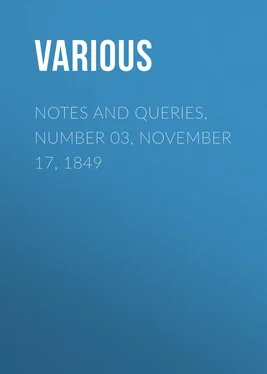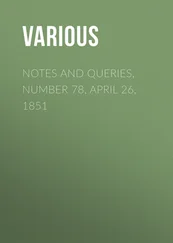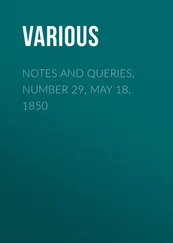Various - Notes and Queries, Number 03, November 17, 1849
Здесь есть возможность читать онлайн «Various - Notes and Queries, Number 03, November 17, 1849» — ознакомительный отрывок электронной книги совершенно бесплатно, а после прочтения отрывка купить полную версию. В некоторых случаях можно слушать аудио, скачать через торрент в формате fb2 и присутствует краткое содержание. Жанр: foreign_antique, periodic, foreign_edu, на английском языке. Описание произведения, (предисловие) а так же отзывы посетителей доступны на портале библиотеки ЛибКат.
- Название:Notes and Queries, Number 03, November 17, 1849
- Автор:
- Жанр:
- Год:неизвестен
- ISBN:нет данных
- Рейтинг книги:5 / 5. Голосов: 1
-
Избранное:Добавить в избранное
- Отзывы:
-
Ваша оценка:
- 100
- 1
- 2
- 3
- 4
- 5
Notes and Queries, Number 03, November 17, 1849: краткое содержание, описание и аннотация
Предлагаем к чтению аннотацию, описание, краткое содержание или предисловие (зависит от того, что написал сам автор книги «Notes and Queries, Number 03, November 17, 1849»). Если вы не нашли необходимую информацию о книге — напишите в комментариях, мы постараемся отыскать её.
Notes and Queries, Number 03, November 17, 1849 — читать онлайн ознакомительный отрывок
Ниже представлен текст книги, разбитый по страницам. Система сохранения места последней прочитанной страницы, позволяет с удобством читать онлайн бесплатно книгу «Notes and Queries, Number 03, November 17, 1849», без необходимости каждый раз заново искать на чём Вы остановились. Поставьте закладку, и сможете в любой момент перейти на страницу, на которой закончили чтение.
Интервал:
Закладка:
I have never been at Colchester, but I believe it is, and always was, full fifty miles from London. Ipswich, I believe, is only eighteen miles farther; and yet fifteen years later we find an advertisement ( Daily Advertiser , Thursday, Aug. 30, 1764), announcing that London and Ipswich Post Coaches on steel springs (think of that, and think of the astonished Germans careering over the country from Colchester without that mitigation), from London to Ipswich in ten hours with Postillions, set out every morning at seven o'clock, Sundays excepted, from the Black Bull Inn, in Bishopsgate Street.
It is right, however, to add that the Herr Preniger Schultz and his companion appear to have returned to Colchester, on their way back to Germany, at a much more moderate pace. The particulars do not very exactly appear; but it seems from his journal that on the 16th of September they dined with the Herr Prediger Pittius, minister of the German Church in the Savoy, at twelve o'clock ( nach teutscher art , as the writer observes). They then went to their lodging, settled their accounts, took up their luggage, and proceeded to the inn from which the "Stäts-Kutsche" was to start; and on arriving there found some of their friends assembled, who had ordered a meal, of which they partook. How much time was occupied in all this, or when the coach set out, does not appear; but they travelled the whole night, and until towards noon the next day, before they got to Colchester. This is rather more intelligible; but as to their up-journey I really am puzzled, and shall be glad of any explanation.
Yours, &c.
G.G.
SANUTO'S DOGES OF VENICE
Mr. Editor,—Among the well-wishers to your projected periodical, as a medium of literary communication, no one would be more ready to contribute to it than myself, did the leisure I enjoy permit me often to do so. I have been a maker of Notes and Queries for above twenty-five years, and perhaps should feel more inclined to trouble you with the latter than the former, in the hope of clearing up some of the many obscure points in your history, biography, and poetical literature, which have occurred to me in the course of my reading. At present, as a very inadequate specimen of what I once designed to call Leisure Moments , I beg to copy the following Note from one of my scrap-books:—
In the year 1420, the Florentines sent an embassy to the state of Venice, to solicit them to unite in a league against the ambitious progress of Filippo Maria Visconti, Duke of Milan; and the historian Daru, in his Histoire de Venise , 8vo., Paris, 1821, has fallen into more than one error in his account of the transaction. Marino Sanuto, who wrote the lives of the Doges of Venice in 1493 (Daru says, erroneously, some fifty years afterwards), has preserved the Orations made by the Doge Tomaso Mocenigo, in opposition to the Florentine proposals; which he copied, according to his statement, from a manuscript that belonged to the Doge himself. Daru states, that the MS. was communicated to him by the Doge; but that could not be, since the Doge died in 1423, and Sanuto was not born till 1466. An abridged translation of these Orations is given in the Histoire de Venise , tom. ii, pp. 289-311.; and in the first of these, pronounced in January, 1420 (1421, Daru), he is made to say, in reference to an ambassador sent by the Florentines to the Duke of Milan, in 1414, as follows: "L'ambassadeur fut un Juif , nommé Valori, banquier de sa profession,", p. 291. As a commentary on this passage, Daru subjoins a note from the Abbé Laugier, who, in his Histoire de Venise , liv. 21., remarks, 1. That it appears strange the Florentines should have chose a Jew as an ambassador; 2. That his surname was Bartolomeo, which could not have been borne by a Jew; 3. That the Florentine historian Poggio speaks of Valori as having been one of the principal members of the Council of Florence. The Abbé thence justly concludes, that the ambassador could not have been a Jew; and it is extraordinary that Daru, after such a conclusive argument, should have admitted the term Jew into his text. But the truth is, that this writer (like many others of great reputation) preferred blindly following the text of Sanuto, as printed by Muratori 2 2 In the Rerum Italicarum Scriptores , tom. xxii. col. 947., the passage stands thus: "Fu mandato Bartolomeo Valori, hom giudeo , el qual vivea di cambi." Two late copies of Sanuto, formerly in the Guildford collection, and now in the British Museum, MS. Add. 8575, 8576, read, "Bartoli Valori, hom iudio."
, to the trouble of consulting any early manuscripts. It happens, however, that in a manuscript copy of these Orations of Mocenigo, written certainly earlier than the period of Sanuto, and preserved in the British Museum, MS. Add. 12, 121., the true reading of the passage may be found thus:—"Fo mandato Bartolomio Valori, homo richo , el qual viveva de cambij." By later transcribers the epithet richo , so properly here bestowed on the Florentine noble, was changed into iudio ( giudeo ), and having been transferred in that shape into Sanuto, has formed the groundwork of a serious error, which has now existed for more than three centuries and a half.
British Museum, Nov. 7. 1849
LETTERS OF LORD NELSON'S BROTHER IMMEDIATELY AFTER THE BATTLE OF TRAFALGAR
[The following letters will be best illustrated by a few words derived from the valuable life of our great naval hero lately published by Mr. Pettigrew. Besides his last will, properly so called, which had been some time executed, Lord Nelson wrote and signed another paper of testamentary character immediately before he commenced the battle of Trafalgar. It contained an enumeration of certain public services performed by Lady Hamilton, and a request that she might be provided for by the country. "Could I have rewarded those services," Lord Nelson says, "I would not now call upon my country; but as that has not been in my power, I leave Emma Hamilton, therefore, a legacy to my king and country, that will give her ample provision to maintain her rank in life." He also recommended to the beneficence of his country his adopted daughter. "My relations," he concludes, "it is needless to mention; they will of course be amply provided for."
This paper was delivered over to Lord Nelson's brother, together with his will. "Earl Nelson, with his wife and family, were then with Lady Hamilton, and had indeed been living with her many months. To their son Horatio, afterwards Viscount Trafalgar, she was as attentive as a mother, and their daughter had been almost exclusively under her care for education for six years. The Earl kept the codicil in his pocket until the day 120,000 l. was voted for him by the House of Commons. On that day he dined with Lady Hamilton in Clarges Street, and learning at table what had been done, he brought forth the codicil, and throwing it to Lady Hamilton, coarsely said, she might now do with it as she pleased."—Pettigrew's Memoirs of Nelson , ii. 624, 625. Lady Hamilton took the paper to Doctors' Commons, where it stands registered as a codicil to Nelson's will. A knowledge of these circumstances is necessary to the full understanding of our correspondents communication.]
Sir,—The following letters may be found interesting as illustrative of the private history of Lord Nelson, to which public attention has been strongly drawn of late by the able work of Mr. Pettigrew. The letters were addressed by Earl Nelson to the Rev. A.J. Scott, the friend and chaplain of the fallen hero.
18, Charles Street, Berkeley Square,
Dec. 2. 1805.
Dear Sir,—I am this day favoured with your obliging letter of October 27. 3 3 The Battle of Trafalgar was fought October 21.
The afflicting intelligence you designed to prepare me for had arrived much sooner; but I am duly sensible of the kind motive which inducted this mark of your attention and remembrance.
Интервал:
Закладка:
Похожие книги на «Notes and Queries, Number 03, November 17, 1849»
Представляем Вашему вниманию похожие книги на «Notes and Queries, Number 03, November 17, 1849» списком для выбора. Мы отобрали схожую по названию и смыслу литературу в надежде предоставить читателям больше вариантов отыскать новые, интересные, ещё непрочитанные произведения.
Обсуждение, отзывы о книге «Notes and Queries, Number 03, November 17, 1849» и просто собственные мнения читателей. Оставьте ваши комментарии, напишите, что Вы думаете о произведении, его смысле или главных героях. Укажите что конкретно понравилось, а что нет, и почему Вы так считаете.












